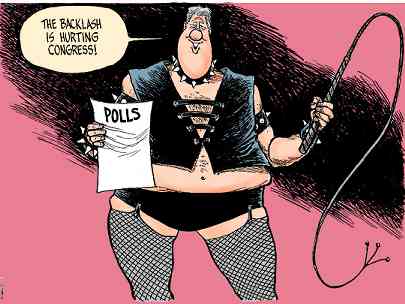|
|
Jewish World Review /Oct. 22, 1998 /3 Mar-Cheshvan, 5759
Ben Wattenberg
Perhaps never have so many known so little about so much. First, experts
said Democrats could regain control of the House of Representatives. Then,
after Ken Starr's sizzling report appeared, experts said the Republican
"base" was "energized," which would help the GOP win solidly in the House,
perhaps getting the 60 senators needed for a "filibuster-proof" Senate.
What's up? The nine latest so-called "generic" surveys, all taken in early
to mid-October, show that among likely voters Democrats are in this
position: +3 percent, +2 percent, +2 percent, +1 percent, +4 percent, -8
percent, -9 percent, -2 percent and dead even. The managing editor of the
Gallup Poll should know what's up. "Democratic interest surged over the last
two weeks, where Republican interest stayed the same..." Lydia Saad said
recently, "(but) Republican voters are now showing more partisan loyalty
than Democrats, with party support rates very similar to 1994."
But in 1994, Republicans got 53.5 percent of the two-party vote and gained
52 House seats, even though many polls had showed Democrats ahead. That tilt
is normal: The Republican vote is often understated in generic polls. Simply
put, a sample of a mythical national election cannot give an accurate view
of 435 separate local House races, where critical contests often swing on
laser-thin margins.
This year there's an extra joker in the deck: Clinton's possible
impeachment. Will Republicans turn out to show Clinton the door? (Some polls
do show that "moral values" are the number one issue.) Or will Democrats
turn out to protect him? No one knows. The surveys show only a small
minority who say their view of Clinton will affect their vote, and those are
split roughly evenly pro and con. But the surveys don't tell whether these
are voters who would have voted that way anyway.
Ignorance about elections breeds labels. In 1992 we were told it was the
"Year of the Woman." In 1994 it was the "Year of the Angry White Male." 1996
was named for "Soccer Moms." Now, some Democratic spinners are saying this
will be the "Year of the Waitress" -- if she votes, the Dems will do well.
(But dessert may come late.)
The spinning will continue after the election. Democrats are already hyping
the so-called "six year itch." That is, the party of a two-term President
loses big in the election held during his sixth year in office -- an average
of 26 seats. Anything better allegedly "beats expectations."
But the itch law comes mostly from the records of Presidents who won second-term
landslides, like Franklin Roosevelt, Eisenhower, Nixon and Reagan. As the
saying goes: "The ferry brings in the garbage," the garbage being
congresspersons who won only with Presidential help, and subsequently lost
without it. But Clinton didn't win big in 1996; he only got 49 percent. He
has little congressional garbage to lose in 1998, and Democrats have little
basis to cite the itch.
Republicans have their own spin: Clinton won't be able to govern because
he's been a bad boy. But the President has the Constitution on his side.
Thus, the recent budget negotiations were between 228 House Republicans and
55 Senate Republicans versus just one President, who had just one veto pen.
What's at stake? Not much in terms of change. Beneath the partisan hubbub,
both sides properly brag about the budget surplus, reduced welfare rolls and
lower crime rates. These are not issues Democrats used to boast about. The
terrain upon which Americans play politics has changed, for the better.
And so it will likely remain. If the Republicans win -- the status quo
remains. Even reaching "filibuster-proof" levels won't likely mean much --
the President still retains veto power. If Democrats win the House, the GOP
would continue to hold the Senate, a fine mechanism to foil any serious
liberal moves.
Most experts, notwithstanding lack of data, are predicting mild gains for
the Republicans in the House and mild-to-moderate-gains in the Senate.
That's likely. The healthy economy should help incumbents, mostly
Republicans. The GOP has more money. And in non-Presidential year elections,
voters see their vote for Governor as the most important one they cast.
Seventy-three percent of the population lives in states with Republican
governors, and some GOP re-election landslides are in the making: Bush in
Texas, Pataki in New York, Engler in Michigan, Ridge in Pennsylvania. They
may bring in some congressional garbage.
If you're looking for big change, one way or the other, wait till 2000.
 Election pundits know nothing
Election pundits know nothing
ELECTION 1998. The important questions: 1. Where are we? 2. What's at
stake? The answers: 1. No one knows. 2. Probably not much.
 Then, after President Houdini's videotaped testimony was played, a
"backlash" against Republi-porn was sighted, showing Democrats energized.
Now, experts say Clinton won the battle of the budget, yielding momentum.
(Quick, what did he win?)
Then, after President Houdini's videotaped testimony was played, a
"backlash" against Republi-porn was sighted, showing Democrats energized.
Now, experts say Clinton won the battle of the budget, yielding momentum.
(Quick, what did he win?)

10/15/98: The too-big-to-fail doctrine
9/29/98: The Jerk Factor at work
9/24/98: American civic engagement thriving
9/16/98: Anatomy of a cover-up
9/09/98: Draft Joe Lieberman!
9/03/98: Get over it, folks
8/28/98: McGwire. Maris. Ruth. Clinton.
8/20/98: Is consuming a Big Mac eating?
Ben Wattenberg is a senior fellow at the
American Enterprise Institute
and is the moderator of PBS's "Think Tank."